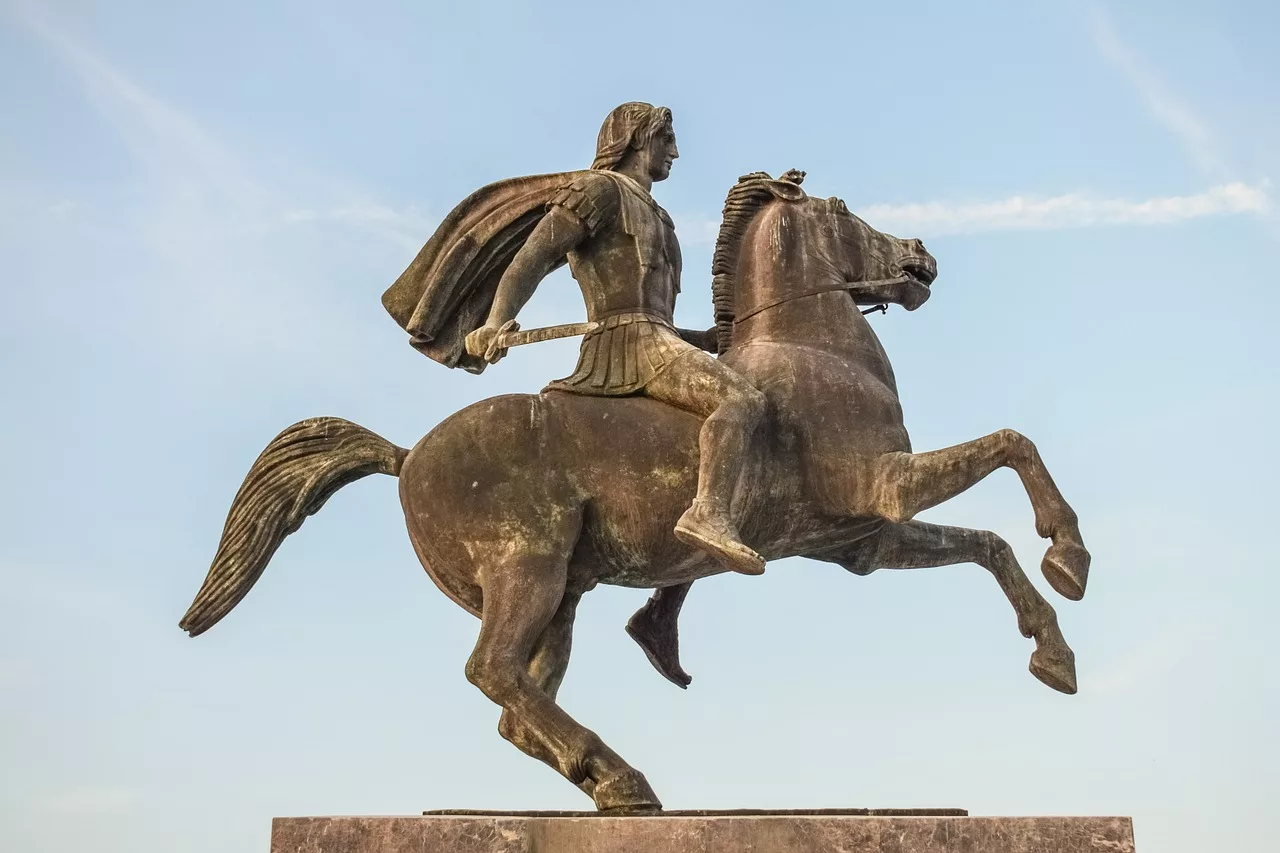Alexander the Great is one of history’s most celebrated figures, renowned for his military genius and visionary strategies that created one of the largest empires of the ancient world. Born in Macedonia in 356 BCE, he rose to power in his early twenties and launched a series of extraordinary military campaigns that would reshape the known world. His conquests stretched from Greece to Egypt and reached as far as India, leaving an indelible mark on history, culture, and civilization. Here are 13 unbelievable facts about Alexander the Great’s conquests that showcase his ambition, brilliance, and lasting impact on the world.
1. Alexander Never Lost a Battle
One of the most incredible achievements of Alexander is his perfect record in battle. Over his twelve years of campaigns, Alexander led his armies into numerous confrontations against some of the most formidable forces of his time, including the Persian Empire, one of the world’s most powerful superpowers. Despite being often outnumbered, he won every single one of his battles, thanks to his innovative tactics, courageous leadership, and ability to inspire his troops. Alexander’s flawless record in battle is nearly unparalleled, setting him apart as one of the most effective military commanders in history.
Each victory further expanded his territory and cemented his legacy as a military genius. He frequently employed unconventional strategies, such as his use of the “hammer and anvil” tactic at the Battle of Gaugamela, which allowed him to conquer the vast Persian Empire with a relatively small army. This unique ability to adapt and think creatively in warfare is a significant reason for his undefeated record.
2. Conquered the Persian Empire in Only Three Years
One of the most astonishing feats of Alexander’s career was his rapid conquest of the Persian Empire. At the time, Persia was the wealthiest and most powerful empire in the world, stretching across vast territories and boasting large, well-trained armies. Starting his campaign against Persia in 334 BCE, Alexander, with a force of only around 40,000 men, took on an empire that had reigned supreme for over two centuries.
In just three years, Alexander had achieved the unthinkable by defeating Darius III, the Persian king, and effectively conquering the entire Persian Empire. His stunning speed in bringing down this superpower not only highlights his military skill but also his ambition and relentless drive. His successful invasion of Persia marked a major shift in power in the ancient world and paved the way for Greek influence to spread eastward.
3. Founded Over 20 Cities Named Alexandria
As he expanded his empire, Alexander founded a series of cities, many of which he named Alexandria in his honor. These cities were strategically placed along trade routes, often in conquered territories, to serve as administrative centers and to spread Greek culture and influence. The most famous of these is Alexandria in Egypt, which became a center of learning and culture, housing the famous Library of Alexandria and attracting scholars, philosophers, and scientists from across the world.
By founding these cities, Alexander not only left a physical imprint on the landscape but also established hubs for the blending of Greek and local cultures, a process known as Hellenization. These cities became symbols of Alexander’s legacy, surviving long after his death and continuing to play important roles in the regions they occupied.
4. Had Legendary Tutors, Including Aristotle
As the son of King Philip II of Macedonia, Alexander had access to the finest education. His father hired Aristotle, one of the greatest philosophers of all time, to serve as his tutor. Under Aristotle’s guidance, Alexander was exposed to a broad range of subjects, including philosophy, science, medicine, and literature. Aristotle’s teachings instilled in Alexander a lifelong love of learning and a respect for Greek culture, which he later spread across his empire.
The influence of Aristotle on Alexander can be seen in the ruler’s curiosity about the world and his appreciation for cultural diversity. Aristotle’s teachings likely shaped Alexander’s approach to governance, where he often respected the customs and religions of the lands he conquered. This relationship between student and teacher is one of history’s most fascinating intellectual pairings and played a significant role in shaping Alexander’s approach to leadership and conquest.
5. Crossed the Hindu Kush Mountains and Entered India
In his quest to reach the ends of the known world, Alexander led his troops across the treacherous Hindu Kush mountains to enter the Indian subcontinent. This was an incredible feat, as the Hindu Kush is a high mountain range with rough terrain and harsh weather conditions. Despite these challenges, Alexander pushed his army through, demonstrating his determination and resilience.
Once in India, Alexander’s forces engaged in fierce battles against powerful kingdoms, including the Battle of the Hydaspes against King Porus. Although Alexander ultimately won, he was so impressed by King Porus’s bravery and skill that he allowed him to retain his kingdom and even gave him additional territory. The decision to enter India marked the easternmost extent of Alexander’s empire and showcased his unyielding ambition.
6. His Troops Mutinied at the Beas River
Alexander’s relentless campaign eventually took its toll on his soldiers. After years of marching and fighting across vast territories, they grew weary and homesick. At the Beas River in India, his troops finally refused to go any further. They were physically and mentally exhausted and feared facing even greater challenges in unknown lands.
Alexander tried to persuade his soldiers to continue, delivering a passionate speech about glory and the importance of their mission. However, he ultimately had to concede and turn back. This moment marked the first time his army had refused his command, signaling the limit of Alexander’s power and the beginning of the end for his conquests.
7. Brought Greek Culture to the East
One of the most lasting impacts of Alexander’s conquests was the spread of Greek culture throughout the East. Known as Hellenization, this process involved the blending of Greek language, art, philosophy, and customs with the local cultures of the territories Alexander conquered. Greek became the lingua franca of the ancient world, allowing people from different regions to communicate and exchange ideas.
The influence of Greek culture in the East can be seen in the art, architecture, and philosophy that emerged in the centuries following Alexander’s conquests. For example, the city of Alexandria in Egypt became a hub of intellectual and cultural exchange, blending Greek and Egyptian elements in ways that influenced later civilizations. Alexander’s empire may have been short-lived, but the cultural impact of his conquests endured for centuries.
8. Became Pharaoh of Egypt
After defeating the Persian forces in Egypt, Alexander was welcomed as a liberator and crowned as Pharaoh of Egypt. In 332 BCE, he arrived in Egypt, which was then under Persian control, and quickly gained the favor of the Egyptian people. As pharaoh, he was recognized as both a political and religious leader, a title that also declared him a god in the eyes of the Egyptians.
Alexander’s time in Egypt was relatively peaceful, allowing him to establish Alexandria and plan further conquests. The title of pharaoh not only cemented his authority over Egypt but also symbolized his acceptance of the diverse cultures within his empire. This role highlighted Alexander’s ability to adapt and respect the customs of the people he conquered.
9. Became Known as “King of Asia”
Alexander’s decisive victory at the Battle of Gaugamela in 331 BCE solidified his control over Persia and earned him the title “King of Asia.” After defeating Darius III, he inherited the Persian Empire’s vast territories, which included the regions now known as Iraq, Iran, Syria, and parts of Turkey. This title was not merely ceremonial; it represented Alexander’s dominance over one of the world’s greatest empires and solidified his place as one of history’s most powerful rulers.
His new status as King of Asia marked a turning point in his career. No longer just the king of a small Greek kingdom, Alexander had become a global ruler with authority over a vast, multicultural empire. This title also fueled his ambition to continue expanding his territory, driving him deeper into Asia in search of new lands to conquer.
10. Encouraged Intermarriage Between Cultures
Alexander encouraged intermarriage between his Greek and Macedonian soldiers and the local populations in conquered territories. He believed that these cross-cultural unions would help to unite his diverse empire and strengthen loyalty among his new subjects. To promote this policy, he even arranged a mass wedding at Susa, where he and many of his officers married Persian noblewomen.
These marriages were part of Alexander’s vision of creating a harmonious, multicultural empire where Greek and Eastern cultures could blend. Although the policy was not universally popular among his men, it demonstrated Alexander’s commitment to bridging cultural divides and integrating the peoples he had conquered.
11. Created One of the World’s First Multicultural Empires
Alexander’s empire was unique in that it was one of the first in history to span multiple continents and encompass a wide range of cultures, religions, and languages. Unlike other conquerors who imposed their own culture on conquered peoples, Alexander sought to integrate and respect the diverse traditions within his empire. He adopted Persian dress and customs, encouraged the spread of Greek language and culture, and allowed religious freedom.
This policy of tolerance and integration helped to create a multicultural empire that laid the foundation for the Hellenistic world. Alexander’s empire became a place where ideas, knowledge, and cultures could flow freely, setting the stage for future civilizations and influencing the development of the modern world.
12. Claimed to Be a God
Alexander was deeply influenced by the Greek belief in the divine right of kings, and over time, he began to portray himself as a god-like figure. During his time in Egypt, he visited the oracle at Siwa, where he was allegedly proclaimed the son of Zeus-Ammon, a deity worshiped by both Greeks and Egyptians. This claim reinforced his authority and helped to legitimize his rule over a vast, diverse empire.
This belief in his own divinity alienated some of his men, particularly the Macedonian nobility, who viewed it as arrogance. However, the image of Alexander as a god-king helped to solidify his status and influence across his empire, even if it created tension within his inner circle.
13. Died at 32, Leaving His Empire Divided
Perhaps the most unbelievable fact about Alexander is that, despite his vast achievements, he died at the young age of 32. In 323 BCE, while in Babylon, Alexander fell ill and died under mysterious circumstances. His untimely death left his empire without a clear successor, leading to a power struggle among his generals, known as the Diadochi. This eventually led to the division of his empire into several Hellenistic kingdoms.
Though his empire did not survive intact, Alexander’s legacy lived on through the influence of Greek culture and the political changes he had set in motion. His brief life and incredible accomplishments continue to captivate historians and inspire awe, cementing his status as one of history’s most legendary figures.
Alexander the Great’s conquests remain one of the most extraordinary feats in military and cultural history. His unparalleled military prowess, ambitious vision, and willingness to integrate cultures transformed the ancient world, forging connections between East and West that would shape civilization for centuries. Although his empire fragmented soon after his death, Alexander’s influence endured through the spread of Greek language, art, philosophy, and science across his former territories, fostering a rich period of cultural exchange known as the Hellenistic Age. His legacy goes beyond his battlefield victories; it lies in the creation of a new, interconnected world where knowledge, ideas, and cultures could flourish together. To this day, Alexander is celebrated not only as a conqueror but as a visionary leader whose conquests changed the course of history, leaving an indelible mark that still fascinates and inspires.




